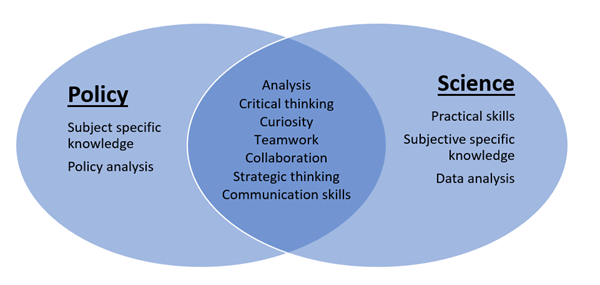Published: 28 Oct 2021
Category:

Many of us undertaking studies at undergraduate and/or postgraduate level are indoctrinated to focus on careers within one of two broad spheres – academia and industry. However, less than 18% of PhD graduates become Principal Investigators or faculty staff, which means the majority of us are more likely to go into these so-called ‘alternative’ careers outside of academia and industry.
To help combat the lack of information about ‘alternative’ careers and to address this unhelpful preconception about post-study career options, the Society’s Early Career Pharmacologists Advisory Group arranged a seminar during Pharmacology 2021 entitled ‘Careers Outside of Academia & Industry’. We welcomed speakers from diverse career backgrounds to share their journeys with us.
Our speakers were:
- Dr Natasha Walker, Trainee Clinical Scientist within the NHS
- Dr Dorothy Aidulis, Director of STEM Scotland Ltd
- Dr Rebecca Elliott, Prevention Policy Manager at the British Heart Foundation
- Dr Sorrel Bunting, Head of Communities & Engagement at Springer Nature
During the session, our excellent speakers gave insights, guidance, and top tips for excelling in careers outside of academia and industry. We have summarised the talks from our speakers in this blog to ensure as many people as possible can benefit from their advice.
Natasha completed her degree at the University of Aberdeen, specialising in physiology before undertaking a PhD. Following completion of her PhD in 2020 and subsequent postdoctoral work, Natasha wanted to use her scientific skillset to directly impact patient care. She transitioned into a career in the NHS at the height of the pandemic – testing care home staff and residents for COVID-19 in Scotland. She is now a trainee Clinical Scientist (Genomics and Molecular Pathology) within the NHS.
Natasha highlighted that over half of all NHS employees are not clinically qualified, showing that there are many alternative routes into patient-centred careers outside of a medical degree. Roles within the NHS include the Healthcare Scientists, who use their technological and scientific skillsets to play key roles in diagnosis and prevention of diseases, and creating treatment strategies for patients.
When Natasha was deciding her next steps after her postdoctoral work, she asked herself if she wanted to be a Principal Investigator within academia – a question she recommends those debating their future careers to think carefully about. Natasha’s tips include asking yourself how you honestly and truthfully feel about:
- Short-term contracts, which are common within academia
- The publish or perish mindset within research
- If you want to use your skillset in other sectors, such as within healthcare
Dorothy completed her PhD in pharmacology and then conducted postdoctoral research in Glasgow and Newcastle before moving to education - initially, through high school teaching and then as a lecturer in pharmacology. After 15 years of lecturing, Dorothy started her own company, STEM Scotland Ltd.
A key piece of advice Dorothy lives by is ‘find something you enjoy doing because you need to do it every day’ and ‘if you are not passionate, don’t stay just because that’s the track you started on’. Moving to new careers requires overcoming ‘blocks’, for example, imposter syndrome, characterised by feelings of doubt in your abilities. But it is important to recognise that you bring your own unique and valuable perspective and experiences to new situations.
When considering possible careers, Dorothy recommends starting by choosing one practical step you can take now. You can do this by:
- Brainstorming - what are you good at and what fires you up?
- Considering who you already know and who you could get in touch with
- Creating (or updating) your LinkedIn profile
- Making a list of questions. What are you unsure about? What do you need more information about?
Rebecca completed her chemistry degree and then her DPhil at the University of Oxford. She continued her research career as a postdoctoral researcher within the British Heart Foundation (BHF) Centre of Research Excellence before then becoming a Policy Officer for the BHF in 2018. Rebecca is now the BHF’s Prevention Policy Manager.
During her talk, Rebecca showed that many of the skills she had developed during her time in research were transferrable outside of academia (see figure 1). Rebecca’s awareness of these skills was a massive confidence boost when moving to another career.
 Figure 1.
Figure 1. A Venn diagram showing the overlap between the skills needed for science and policy work.
If you are interested in policy careers, it can be useful to get involved in policy consultations (such as through the British Pharmacological Society). You can also review the Parliamentary Office for Science and Technology (POST) notes and associated Fellowships. Subscribing to Government department mailing lists can also provide invaluable insights into the world of science policy.
Careers in science communication and public engagement – Dr Sorrel Bunting
Sorrel completed her BSc in biochemistry at Imperial College London before starting her PhD in cancer cell biology at King’s College London. During her PhD, Sorrel realised she loved science communication and began working at the BHF upon completion. Sorrel then joined the British Pharmacological Society as Engagement Manager and is now working for Springer Nature as Head of Communities & Engagement.
Sorrel’s top tips for moving to new careers include:
- Find opportunities that YOU are excited about
- Build your experience and don’t forget about transferable skills
- Reach out to people whose careers you admire or who have careers that you are curious about pursuing
- Keep trying! Your first application may not be successful but do not be disheartened
To find roles in science communication, Sorrel recommends keeping an eye on mailing lists and groups such as the BIG STEM Communicators Network. Some additional information on careers in science communication can be found here.
There are many exciting opportunities for pharmacology-related careers. The British Pharmacological Society has an excellent ‘careers in pharmacology’ page, and other pharmacology careers can be found through prospects.ac.uk.
Comments
If you are a British Pharmacological Society member, please
sign in to post comments.